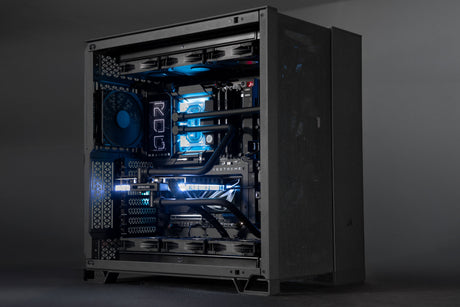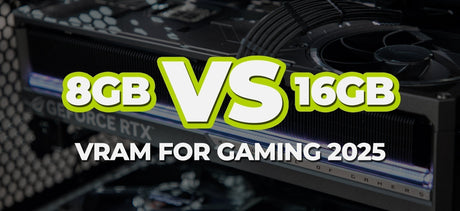The competitive pricing of previous generation cards can often make them a compelling option over the latest cutting-edge graphics technology from Nvidia and AMD. To meet this demand, Computer Lounge has managed to secure stock of AMD’s previous generation flagship card, the AMD Radeon RX 6950XT.
The RX 6950XT offers increased VRAM and up to an incredible 20% uplift in rasterization performance over similarly-priced alternatives such as the Nvidia RTX 4070; however it falls short in ray tracing performance, and lacks the latest features offered by Nvidia, such DLSS 3.0 Frame Generation, Nvidia Reflex, Nvidia Broadcast and more.
In this blog post, we will be exploring the performance and feature comparisons between these two cards in detail, to determine which card will be the best choice for your new gaming PC.
| Geforce RTX 4070 | AMD RX 6950 XT | |
|---|---|---|
| VRAM | 12GB GDDR6X | 16GB GDDR6 |
| TDP | 200W | 335W |
| Performance | 12% Faster @ 1080p Ray-Traced | 12% Faster @ 1080p No Ray-Tracing |
| 11% Faster @ 1440p Ray-Traced | 15% Faster @ 1440p No Ray-Tracing | |
| 17% Faster @ 4K No Ray-Tracing | ||
| Features | AV1 Encoding | FSR 2.0 |
| DLSS & Frame Generation | AMF Encoder | |
| G-Sync | FreeSync |
Source: Hardware Unboxed -https://www.youtube.com/watch?v=Iy3ikm8MxOM
Performance:
For gamers seeking unparalleled performance in competitive games with an emphasis on framerates over ray tracing, the RX 6950 XT emerges as a formidable contender. It outperforms the RTX 4070 in terms of raw rasterization performance, delivering a exceptional gaming experience at 1080p and 1440p alike.
At 1080p, the RX 6950 XT card outputs an average of 12% higher FPS over it's competitor when ray-tracing is disabled. However, it must be noted that when ray tracing is enabled, the tables turn in favour of the RTX 4070, which edges ahead with an 11% advantage at 1440p. At the same resolution, with ray tracing disabled, the RX 6950 XT scores another win for team red, with a 15% increase in FPS.
But what about when the resolution is dialed up to 4K? The increased VRAM on the RX 6950 XT affords it a comfortable win, with a truly incredible 17% increase in FPS!
Features:
While the AMD Radeon RX 6950 XT impresses with raw gaming-horsepower, the RTX 4070 offers a plethora of features that enhance visual fidelity and aid in content creation. NVIDIA's support for DLSS 3.0 Frame Generation and performance edge when ray tracing is enabled, delivering unparalleled visual flair, make in a compelling option for those seeking the latest technologies on offer. On the other hand, the RX 6950 XT doesn't ship without competing technologies of it's own; AMD's latest cards offer AMD's FSR 2.0 technology, a competitor to DLSS, although Nvidia arguably has the edge here, as their implementation of AI upscaling is more mature. Furthermore, creators can't overlook NVIDIA's support for AV1 encoding, currently regarded as the ultimate CODEC for content creators wanting to capture and stream their gameplay.
Conclusion:
Ultimately, the choice between the Radeon RX 6950 XT and NVIDIA RTX 4070 hinges on your specific needs and priorities. The RX 6950 XT shines as a powerhouse for gamers prioritizing raw rasterization performance in games, while the RTX 4070 caters to those seeking exceptional ray-traced visuals, bolstered by DLSS frame generation technology. If you want to delve into the world of content creation, NVIDIA's AV1 encoding support becomes a compelling factor to consider. By carefully evaluating these factors, you can confidently select the graphics card that aligns with your requirements and elevates your overall gaming experience.



















